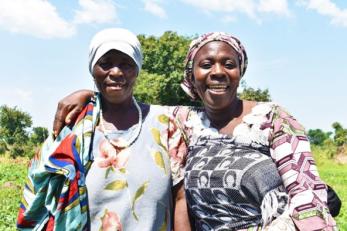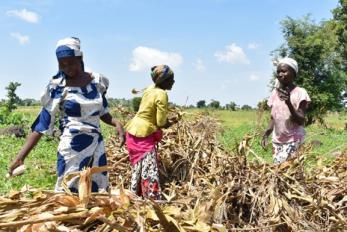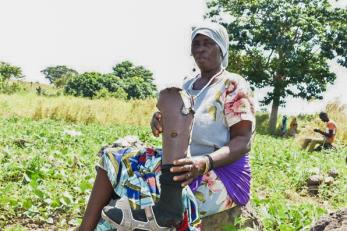Rakiya's journey towards economic empowerment despite adversity

“This farm you are seeing here is a result of little light shone into the darkness of my business from you through grace. Knowledge is indeed light,” Rakiya exclaimed gleefully as she pointed to the women who were harvesting her maize on the farm she purchased with her savings.
Still speaking, Rakiya lowered herself onto a stone and sat on it. She adjusted her scarf and removed her artificial leg, holding it out with a smile. Sitting in the sun, Rakiya embodied resilience, hers is a story of one determined to rise against all odds.
Rakiya is one of the participants who have been trained by the Business Development Service Providers (BDSPs) engaged by the Feed the Future Nigeria Rural Resilience Activity. The goal of the training is to build the capacity and resilience of Savings Groups (SGs) and Micro Small and Medium Enterprises (MSMEs) in business/financial management across Borno, Adamawa, Yobe, and Gombe states.
Rakiya Yakubu is a 53-year-old single mother of one, with eight grandchildren. She is a native of Azare Pitti, in Marama Kidang Ward, Hawul Local Government Area of Borno State. At the age of 14, she had an accident on her way back from school that resulted in her left leg being amputated and replaced with an artificial leg. Recalling the incident, Rakiya said, “I was 14 years old when the accident happened, in my form two, on my way back from Teachers’ College Waka, Biu, since then I couldn’t return to school again.”
The story of Rakiya reflects resilience, determination, and how a willing woman has experienced transformation in her business and finances through knowledge. It has been 39 years since the accident but living with an artificial leg could not deter Rakiya from pursuing her dream of making a living and building economic freedom. “Since I could not go back to school, I knew I would not want to be a liability to anyone, so I had to start the business of selling foodstuff, basically rice, and a little farming to sustain myself and my family,” she said.
Rakiya became a participant of the Rural Resilience Activity in March 2023 through Mrs. Grace, a BDSP who is reaching out to women-owned small-scale businesses to build their capacity and train them on financial management, record keeping, and savings. Most of these women who own small-scale businesses lack the basic requisite knowledge to manage their businesses, take records/stocks, manage their finances, and the discipline of savings. “She (Mrs. Grace) said I can experience change in how I do my business with little steps like keeping records. I told her that I couldn't do it because it seemed impossible, however, she encouraged me to give it a try,” Rakiya shared about meeting Mrs. Grace for the first time.

Having acquired training, Rakiya wasted no time, in applying all the knowledge gained from Mrs. Grace in her business. She usually sells rice in three different markets – Gusi, Marama, and Bulatawiwi markets of Hawul LGA. “Before now, I was just running the business in these markets. Yes, I make sales, but I don’t know where the money goes or what I do with it,” admits Rakiya. “So, I started taking stock of my goods and recording the sales I make per market and the gains I make. She (Mrs. Grace) taught me how to manage my finances and pay myself first through savings before any other thing.”
From her weekly profits of over NGN10,000 from each market, Rakiya saves NGN7,000 every week from each market, making it NGN21,000 weekly. “I honestly could not believe the progress, after a month, I realized that I had saved NGN84,000 and in two months, I was asking Mrs. Grace ‘is this truly my money?’” exclaimed Rakiya.
With the money Rakiya had saved, she purchased a piece of farmland that was a little bit over one hectare and planted maize and cowpea on the farmland. Rakiya testified “I bought this farm in early June, and it was with my savings. I feel fulfilled and happy because it happened during planting season. I feel transformed, my daughter now calls me ‘Hajiya’ who knows how to take care of her finances. She sees me as a role model, and she helps me in the market whenever she can.”
In our community, we have a lot of women who own small-scale businesses who need this kind of knowledge. I believe if they have this kind of knowledge, their lives will change,” Rakiya said passionately as she pointed to the women working on her farm.

With the objectives of building the capacity of microentrepreneurs on financial literacy and recordkeeping through behavior change, the activity engaged 42 BDSPS (26 males and 26 females) in Borno, Adamawa, Yobe, and Gombe states. The training will enable these small-scale business owners to keep track of their finances and business transactions, and set profitable prices for their products as well as make intentional decisions. Rakiya Yakubu is one out of the 1,460 MSMEs they have reached in Borno state where the lives and businesses of 804 female adults, 231 female youths, 244 male adults, and 181 male youths have been transformed.
About the Feed the Future Nigeria Rural Resilience Activity
The Feed the Future Nigeria Rural Resilience Activity is a five-year, US$49 million program funded by the United States Agency for International Development (USAID) to facilitate economic recovery and growth in vulnerable, conflict-affected areas by promoting systemic change in market systems. The Activity is part of the U.S. Government's global hunger and food security initiative. It is aimed at empowering vulnerable households, communities and systems to cope with current shocks and stresses, and to be prepared to withstand future ones.
The Activity is implemented by Mercy Corps, in partnership with the International Fertilizer Development Center (IFDC) and Save the Children (SCI), primarily in the Northeast states of Adamawa, Borno, Gombe, and Yobe. Through the COVID-19 Mitigation Response Program, the Activity's operational areas also include Benue, Kebbi, Niger, and Ebonyi states, as well as the Federal Capital Territory. Using market-led approaches, the Activity will move over 600,000 individuals out of chronic vulnerability and poverty.